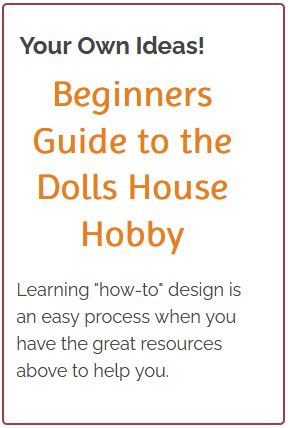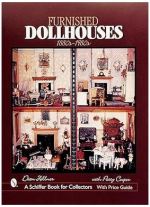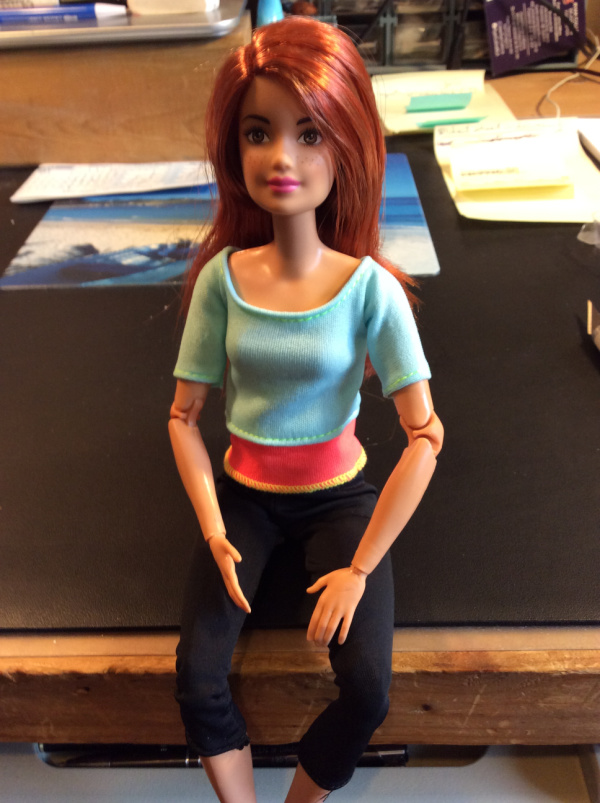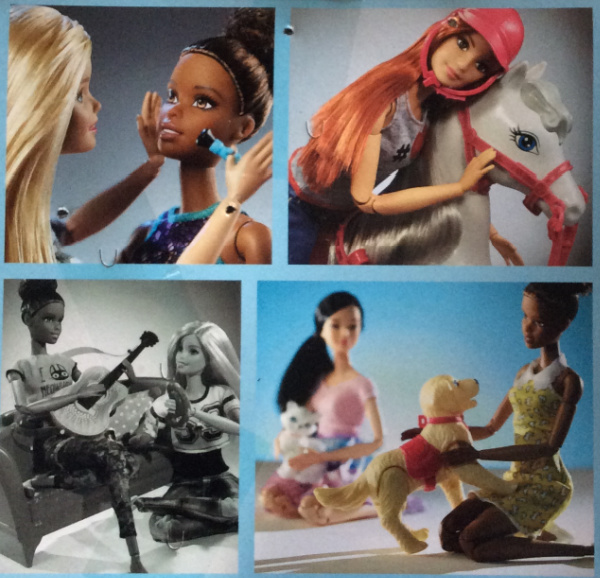Polymer Clay Miniatures
Teach Yourself Doll Creation and Save
About Polymer Clay Miniatures ...
Polymer Clay Miniatures - Used for many miniature objects such as: Dollhouse People, food, small appliances like clocks, kettles etc., brickwork, cookware, stoves, tiles, baskets, and candle-holders, to name only a few.
"Polymer is an oven baked modeling compound, widely used to sculpt minis and food, scale dolls and figures, and scale models." - More Polymer Minis Info
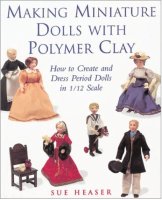 We
love books on Dolls, Dollhouses, Minis, Clothing and everything in between.
We
love books on Dolls, Dollhouses, Minis, Clothing and everything in between.
They provide so much information that otherwise without these books we would not have near the added knowledge that we want to have about each individual topic.
We also simply love books in general anyway. So it should not be a surprise that we are an Amazon affiliate.
From time to time on this site we will include a review of a special text of interest to everyone who views our pages.
And today that is exactly what we intend to do.
Today's review is of a book by Sue Heaser a qualified Art Polymer Clay Miniatures Senior Instructor, entitled, "Making Miniature Dolls with Clay: How to Create and Dress Period Dolls in 1/12 Scale"
Follow us as we review:

-
the contents of her creatively intriguing text from "Sculpting Materials
to "Sculpting the Dolls" to "Making Wigs" to everything in
between. Making your own Polymer Clay Miniatures can be easier than you think,
-
then study a specific project from her fascinating book, titled - "Sculpting a
Woman Doll",
- and conclude with us as we all participate in the creation of our own doll's house people of our choice. Taking the lessons from her text and trying our hand at a tiny person we'll name at the end. (lol, depending on what this doll looks like, since it's our first time for miniature creation like this.)
Our Review Starts Here. Part 1 of 3.
This is a Great Book on Polymer Clay Miniatures."Making Miniature Figures with Clay"
Introducing a most Charming
Masterpiece
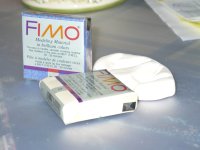 Just What does Sculpting a Tiny Person Involve?
Just What does Sculpting a Tiny Person Involve?
It would seem that sculpting a doll involves, first off, getting your creative juices fired up to start with. And Sue Heaser does that even in her introduction.
Sue Heaser's book, "Making Miniature Figures with Clay" is a clean, easy to read instructional manual with a down-to-earth appeal.
Which is what we as crafters prefer. And we "dollhouse" artists and collectors are crafters.
We don't know about you but when we look for a new dollhouse text, we look for a certain type. That said, even the font style plays a role in the book we often choose. Yes it definitely has to be appealing to the eye, as this volume is.
Really when you think of it. How often have you handled a book with an odd looking display and put it back on the shelf?
But too, this is where individual preference comes into play. Each person as they say, is different.
And the Contents are....
Sue's introduction makes us want to start the work. NOW! She makes it sound as if we CAN do this. Let's hope she's right. Part of our review will include us actually trying what she talks about.
The copyright year is 1999. An older volume now but definitely worth a look if you wish to purchase it and begin your education in tiny people creation.
"Making Miniature Figures with Clay" contains information on: Sculpting and Sewing Materials and Equipment; Sculpting Techniques; Sculpting the Dolls; Assembling; Painting; Dressing them in: Tudor, Regency, Victorian and Edwardian Costume; Making Wigs, plus references for suppliers and further reading.
Another good thing it has is an index. Yes so you can find that subject you are remembering is in this text, again. We love a good index.
The materials and equipment:
This subject is covered very well. From the smoothing ability, translucency, strength, and quantities of the modeling compound.
Then the particular brands are discussed. Brands listed include:
- Fimo,
- Formello,
- Polyform Products,
- Creall-therm,
- Du-kit,
- Cernit,
- and Modelene.
They are examined briefly under each brand of modeling compound listed.
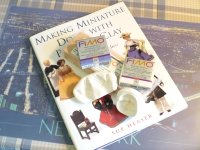 She also
recommends that we not mix different brands because it may effect long-term durability of our
polymer clay miniatures. And we can not have that!
She also
recommends that we not mix different brands because it may effect long-term durability of our
polymer clay miniatures. And we can not have that!
We mean, if you have painstakingly worked on your tiny person you will want it to last. It may make a valuable heirloom to pass on to that adorable grandchild of yours some day.
So don't mix the clays even if you are tempted. By all means, though, mix within the brand names just do not cross mix. For example, DO MIX Fimo products with Fimo products. But DO NOT MIX Fimo products with Sculpey products.
In the Sewing Sections:
....which encompass the various costumes such as Tudor, Regency, Victorian and Edwardian she is again detailed in her layout. Explaining the fabric choices, trimmings, and everything else needed for each of her Polymer Clay Miniature designs.
What we found interesting in these sections was the creation of ones own buttons with this modeling compound. So that basicly does away with any excuse we may have had of not being able to find a tiny enough button to put on a tiny outfit.
As well where a person tells you how to create such things as buttons, can you see the possibilities of taking the knowledge we gain here and expanding it to, say, a Barbie costume. Want a very unique look? Try that. Design your own buttons!
For sure no one else has them on their miniature figures.
Also worth noting is that any costume featured has a very well done pattern to use.
We recommend that you copy any patterns you wish to use onto another source so you don't ruin your volume, using tracing paper or just simply photocopying it onto regular paper. We value all our craft books, as we are sure you do, so that will preserve your copy of this excellent manual.
**And whatever you do, do not sell the material from this volume. All of it belongs to the writer, as it should. ALWAYS and ONLY use your copies for your own personal polymer clay miniatures use.**
The sculpting of the figures:
....is another area of excellence. From the techniques to the actual sculpting to assembling to painting to wig making, she once again encourages us just by reading to get started, NOW.
We credit this creative desire though, not only to this volume but to the season we are currently in. In the spring we always feel like creating. Imagine that lol!
But we will cover more details about Sue's book in Part 2 of our review. Sculpting an Amazing Doll !!
* * Wish to obtain her COMPLETE BOOK and follow us in this awesome review/project? You may purchase this polymer clay miniatures book online HERE.
* * and so ends Part 1 of this review on Polymer Clay Miniatures check by soon for Part 2....
Dear Friend at the Doll House:
As an Amazon Associate we earn from qualifying purchases. So accordingly any link to Amazon opens in a new window on their site and gives us a commission if you buy. In turn it helps earn a small amount toward maintaining this site. Thank you for helping us keep doing what we enjoy.
- Home at the Doll House ›
- More Kinds of Minis ›
- This Page


